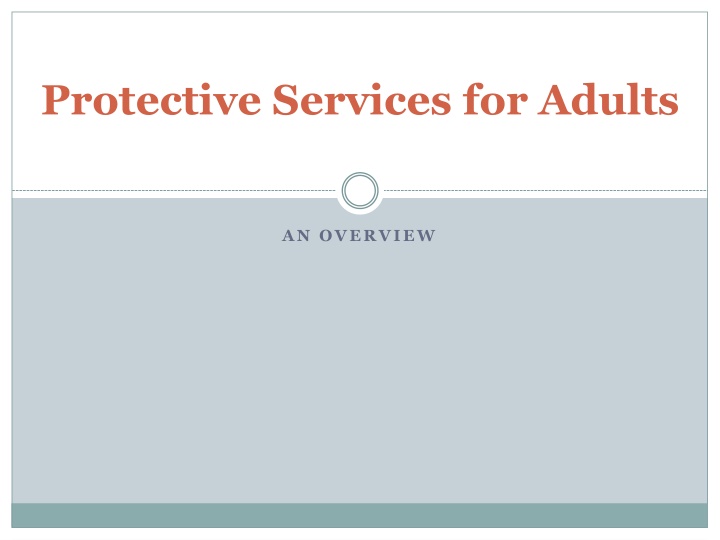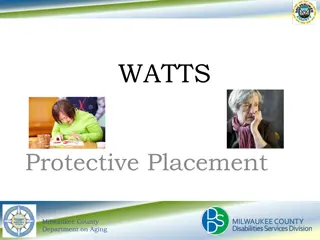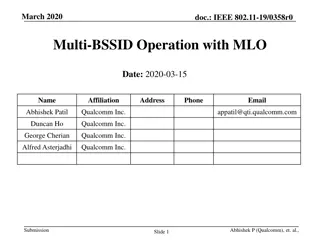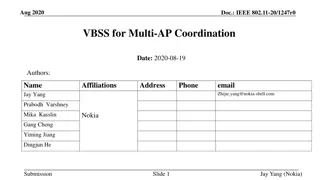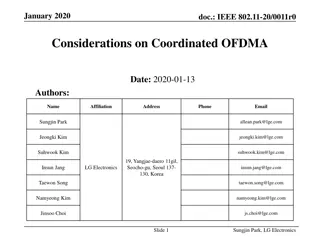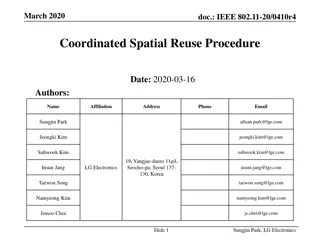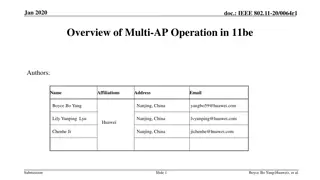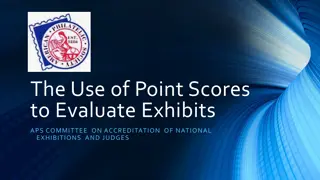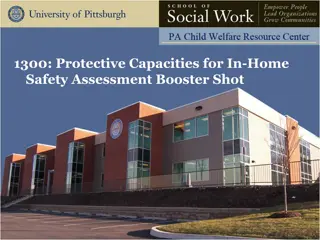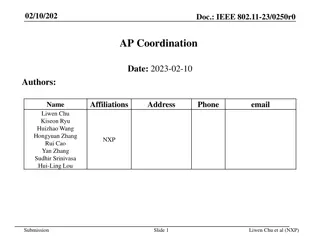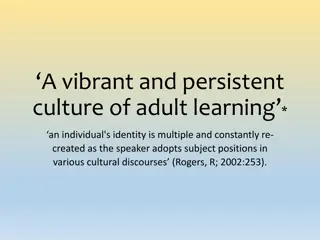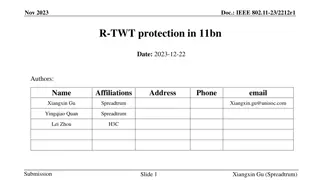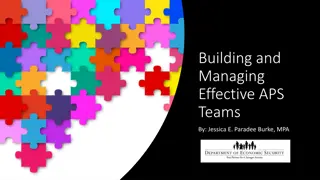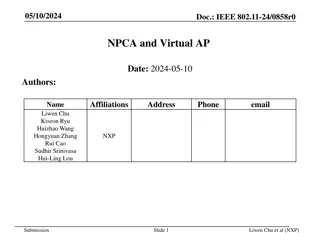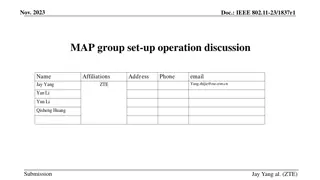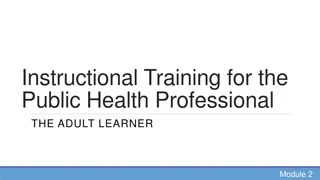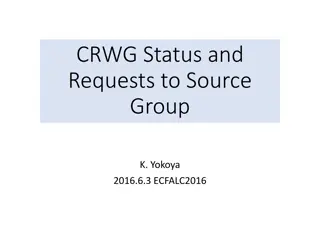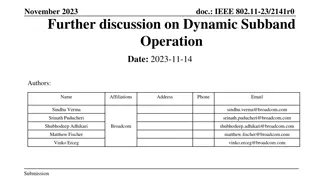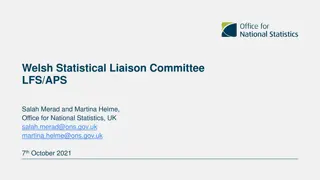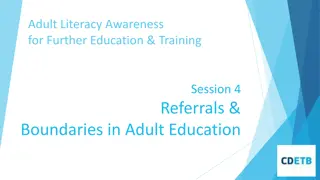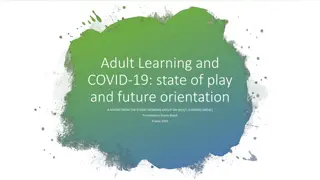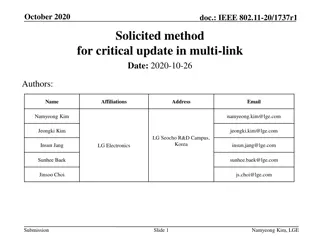Adult Protective Services (APS) in New York: Overview and Interventions
Adult Protective Services (APS) is a state-mandated program in New York that assists mentally and/or physically impaired adults who are unable to manage their own resources or protect themselves without assistance. APS interventions are mostly voluntary, emphasizing the least restrictive alternative to safeguard the needs of vulnerable adults.
Download Presentation

Please find below an Image/Link to download the presentation.
The content on the website is provided AS IS for your information and personal use only. It may not be sold, licensed, or shared on other websites without obtaining consent from the author.If you encounter any issues during the download, it is possible that the publisher has removed the file from their server.
You are allowed to download the files provided on this website for personal or commercial use, subject to the condition that they are used lawfully. All files are the property of their respective owners.
The content on the website is provided AS IS for your information and personal use only. It may not be sold, licensed, or shared on other websites without obtaining consent from the author.
E N D
Presentation Transcript
Protective Services for Adults AN OVERVIEW
What is APS ? Adult Protective Services (APS) is a state-mandated program that helps New Yorkers 18 years of age and older regardless of income who: Are mentally and/or physically impaired; and 2. Due to these impairments, are unable to manage their own resources, carry out the activities of daily living, or protect themselves from abuse, neglect, exploitation or other hazardous situations without assistance from others; and 3. Have no one available who is willing and able to assist them responsibly. 1.
How does APS differ from CPS? No mandated reporting to APS in New York Cases are not indicated, there are no expungement hearings
How does APS differ from CPS? The Concept of Self-determination Adults, unlike children, are legally presumed to have capacity to make their own decisions. This is the concept of self-determination. This means that most adults, even most vulnerable adults who may have impairments and who may be facing danger, have the right to refuse offered services.
APS Interventions Almost all APS interventions are voluntary, except in circumstances where adequately understand inabilities and the adult is likely to suffer harm due to their functional limitations and their inability to appreciate the consequences of such limitations. the adult cannot their and appreciate When legal intervention is considered, the principle of least restrictive intervention is observed.
APS Interventions The Least Restrictive Alternative The U.S. Supreme Court stated in Shelton vs. Tucker, 364 U.S. 479 (1960): "Even though the governmental purpose be legitimate and substantial, that purpose cannot be pursued by means that broadly stifle fundamental personal liberties when the end can be more narrowly achieved." In cases when an involuntary protective services intervention is considered for example, for a guardianship or a civil commitment both APS and the court should inquire whether there are any less restrictive alternatives that will adequately protect the needs of the vulnerable adult. This concept is written into the Social Services Law and the Mental Hygiene Law of the State of New York.
Adult Services Bureau APS is under the auspices of the Department of Social Services, under the Housing & Clients Benefits Administration. There are four geographic field teams, an intake unit, and a guardianship/Family Type Adult Homes (FTAH) unit
How do we determine a person is eligible for Protective Services for Adults? There are three (3) criteria that must be met or unable to be ruled out. 1. Adult is mentally and/or physically impaired; and 2. Due to these impairments, are unable to manage their own resources, carry out the activities of daily living, or protect themselves from abuse, neglect, exploitation or other hazardous situations without assistance from others; and, 3. Have no person, agency or community resource available who is willing and able to assist them responsibly.
Criteria #1 Person has to be 18 years of age or older and must have physical and/or mental impairment (s). The impairment(s) prevents the person from protecting himself/herself from risk or harm which may come about as a result of his/her own actions, the actions of others or from meeting basic essential needs.
Criteria #2 A person must be at risk of harm from the actions of themselves or others or they must have unmet basic essential needs.
Criteria # 3 There must be no person, agency or community resource willing and able to assist responsibly. NOTE: Referrals to APS are accepted if they meet ALL 3 of these criteria.
Why isnt elder/adult abuse reported? Victims often socially isolated by their abuser. They may be incapable mentally and/or physically to report the abuse. They may fear retribution. They may have conflicted feelings if the abuser is an adult child/grandchild who is mentally ill, alcohol dependent or a substance abuser. Victim may believe they are somehow responsible for their child/grandchild s problems or they may not want to see the abuser arrested.
Why isnt elder/adult abuse reported? Abuser may have convinced victim that the abuse is their fault. What they did caused the abuse to occur. They may believe that the abuser doesn t mean it. Things will get better if they do nothing. Fear of the unknown. What happens if the abuser is removed?
Why isnt elder/adult abuse reported? Societal attitudes also contribute to under reporting: These are adults and there is often an attitude that it is none of my business. No one wants to believe this type of abuse takes place in their neighborhood by their neighbors, friends, family etc. Perception that elder/adult abuse is not as important as child abuse.
Categories of Abuse for APS 1) Physical Abuse- any intentional act that causes injury or harm: Examples include slapping, hitting, punching, burning etc. Possible Indicators, if not witnessed, can be bruises, fractures, black eyes etc. or essentially any injury for which the explanation given for the injury is inconsistent with that injury.
Categories of Abuse for APS 2) Psychological/Verbal Abuse The infliction of emotional pain or distress. Examples can be threats, humiliation, cursing, intimidation, yelling at, coercion. Possible indicators, if not witnessed, can be depression, confusion or other dementia type symptoms, anxiety, fear. Victim has an unequal relationship with the abuser.
Categories of Abuse for APS 3) Sexual Abuse Any non-consensual sexual contact. Sexual contact with an individual who is unable to consent, (advanced dementia or serious mental illness) or with an individual who never had the ability to consent (severe developmental disability). Possible indicators can be injuries to genital areas or breasts, sexually transmitted diseases, as well as depression, dementia type behavior and/or anxiety.
Categories of Abuse for APS 4) Financial Abuse/Exploitation the theft or misuse of a person s income and/or resources. Examples can be fraud, forgery, transfers of assets, changes of names on accounts or property, POA abuse, theft of possessions and money. Possible indicators: changes in banking habits, unpaid bills when sufficient income or resources are present, ATM misuse, unusual credit care purchases or transfers of funds.
Categories of Neglect 1) Caregiver Neglect Failure to meet the needs of person under care. Decisions being made not in victim s best interest. Can be active or passive. Caregiver does not have to be family member. Possible signs of caregiver neglect: Malnutrition, dehydration, bedsores, poor hygiene, inadequate clothing, substandard housing , inadequate medications.
Crimes against APS Clients Abuse and severe caregiver neglect may rise to the level of a crime. APS workers are required to report such crimes to law enforcement
Categories of Neglect 2) Self Neglect Historically, approximately 50-60% of referrals allege some form of self neglect. Self neglect is the failure of an individual to maintain adequate: Housing Food Clothing Medical or mental health care etc.
Examples of Self Neglect Hoarding Lack of utilities and/or heat Filth Excessive number of animals Insect and/or rodent infestations Inadequate or non-existent medical care Lack of medications or medications not taken properly Poor hygiene and/or clothing Untreated mental illness Homelessness
Intake Unit: Entry point to APS Call the Intake Unit at: (631) 854-3232
Field Team Assessments Visit made within 3 working days unless potential life threatening or serious indicated. harm condition is In such cases a visit is made within 24 hours.
Caseworkers Initial Visit Caseworker will attempt to interview the client alone. If abuse or neglect is alleged they also will attempt to interview the alleged abuser if present. Caseworker during first visit will attempt to secure information from client regarding: Medical conditions, medications, names of physicians Family, friends, neighbors, agencies involved etc. Income and resources. How they get cleaning, laundry, and cooking done.
During 60 Day Assessment Period, Caseworker May: Apply for entitlements &/or benefits Assist with securing any needed medical care and/or medications Attempt to obtain food or other needed items from community resources Attempt to contact family members, neighbors friends for information and assistance Make referrals to mental health resources if appropriate, and/or Assist if needed with obtaining orders of protection
At the End of Assessment Period If individual is determined to be eligible for APS, a case is opened and the client is visited at least monthly for as long as the person continues to be eligible for APS. If the individual is determined to be ineligible for APS due to one or more of the criteria not being present, APS advises the client and referral source in writing, closed/resolved. and the referral is
When Voluntary Services Are Ineffective Decision is made whether to transfer active APS case to the Guardianship Team. The eligibility determination is made based on degree of risk combined with the individual s understanding of the risk they are facing. If guardianship is indicated, a petition is drafted to ask the Court to appoint an adult guardian for the individual to manage their financial affairs and/or personal needs. If the need for a guardian is established, the judge will appoint a guardian.
Family Type Homes for Adults New York State issues the licenses for Family Type Homes for Adults (FTHA) based on our recommendations. FTHAs provide a family type atmosphere for up to 4 persons who have been determined by a physician to require the supervision and support services these homes provide. FTHAs are an alternative to larger more impersonal proprietary adult homes. Most FTHAs accept the Level I SSI rate.
Services Adult Protective Services include: Investigation and assessment of the adult s needs and risk of harm; Counseling for the victimized adult and their family; Case management including location and arrangement of medical and mental health assessments and services, home health care, home-delivered meals, and homemaker or housekeeper chore services. This could include ongoing assessments and monitoring to assure that the services place continues to be appropriate;
Services (continued- 2) Advocacy to assist in obtaining benefits and services the adult is entitled to; Finding alternative living arrangements, or arranging for emergency room and board for an APS client up to 30 days; Crisis interventions that can be sought if the person, because of an impairment, is incapable of making the choices necessary to remove the endangering condition, include: short-term involuntary protective services orders, orders of protection, admission to a psychiatric facility, admission to a developmental center;
Services (continued - 3) Money management to assist adults who are unable to manage their own resources on their own behalf or protect themselves from exploitation. This can range from informal to more formal means of money management. APS may provide informal money management to assist adults to pay their bills or keep track of their money. APS can act as a representative payee appointed by the Social Security Administration to manage clients Social Security or Supplemental Security Income (SSI) benefits. A protective payee can be established to manage public assistance benefits;
Services (continued - 4) Long-term involuntary interventions, such as seeking guardianship for persons who lack capacity or agree and who need protection to care for their person, their property, or both.
